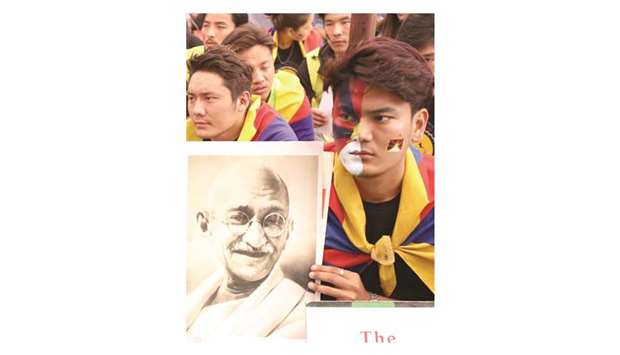Tibetan spiritual leader the Dalai Lama says he doesn’t care about how Chinese pressure forced the cancellation of events of the Tibetan government-in-exile in Delhi to mark 60 years of its presence in India.
Speaking to journalist Vir Sanghvi on CNN News18 network, the Dalai Lama in a wide-ranging interview said it was more about how India feels for Tibetans and how Tibetans feel for India.
He also spoke about how he was originally influenced by Chinese Marxism and he felt he was a Marxist “as far as social economy is concerned”.
The Dalai Lama escaped from Tibet to India in March 1959. The Tibetan government-in-exile is about to complete 60 years in the country. Amid the recent tensions with China, the Indian government was reported to have cautioned its senior officials to stay away from events aimed at marking the start of the Dalai Lama’s 60th year of exile.
He was asked about the Chinese government’s reported indication to India that any official celebration of the 60 years of Tibetans coming to the country would upset it and how he himself was not hurt by New Delhi’s decision not to do anything about.
The Dalai Lama said: “I don’t care about the formalities, have a formal function and deliver a speech. It doesn’t matter, what is important is here (in heart).
“Tibetan people, whether they are at home or away, they have the Tibetan spirit that is wonderful. And I think, a majority - about 99% of them - are Buddhists and about 1% comprise Muslims, Christians, etc.”
Pressed further on how it didn’t matter to him, the Dalai Lama replied that the Tibetan knowledge of Buddha dharma teaches “good self-confidence”.
“You see the totalitarian Marxism... very narrow-minded and short-sighted. I must make it clear that as far as Marxism is concerned, as far as social economy is concerned, I am Marxist. Marxist economy emphasises on equal distribution. That’s very good. The emphasis and special right is given to the working class people, it’s so wonderful.”
He said he was originially impressed by Chinese communism that nourished during the time of Mao Zedong.
He also spoke about his demands for autonomy and recalled how in 1974 the Tibetans gradually decided to talk with the Chinese government and gave up their demand for separation or independence “but at the same time not satisfied with the present condition”.
“Every Chinese knows that we are not seeking separation... we are simply seeking the right which is mentioned in Chinese constitution ... regarding preservation of our culture, including Tibetan language.”
He said the Tibetans established some contacts with successive Chinese governments without any major headway.
“In 2001 or 2002, there was a revival or direct contact under the leadership of (then president) Ziang Zemin. There was a meeting with Chinese officials in 2010 that was the last time. Since then, there has been no direct contact.”
Asked about what severed the communication, he said he didn’t know but “I think some of them are hardliners”.
Relations between China and India have been tense in recent months after their troops faced off on a disputed part of their border. China was also angered by Prime Minister Narendra Modi’s February visit to the northeastern border state of Arunachal Pradesh, also claimed by China.
Authorities in India and Nepal have previously banned protests against China by Tibetans during sensitive times, such as visits by Chinese leaders.
China took control of Tibet in 1950 in what it calls a “peaceful liberation” of the remote, Himalayan region.
An uprising against Chinese rule in Tibet erupted in 1958 and troops crushed it the following year. The Dalai Lama fled from the crackdown and was granted asylum in India.
He was asked about why he may be the last Dalai Lama and if there would be another Dalai Lama after him.
“As early as 1969, I’ve mentioned that (whether) the very institution of Dalai Lama should continue or not is up to the Tibetan people to decide.”

Tibetan activists stage a demonstration on the 60th anniversary of the Tibetan uprising against Chinese rule, in Bengaluru yesterday.
